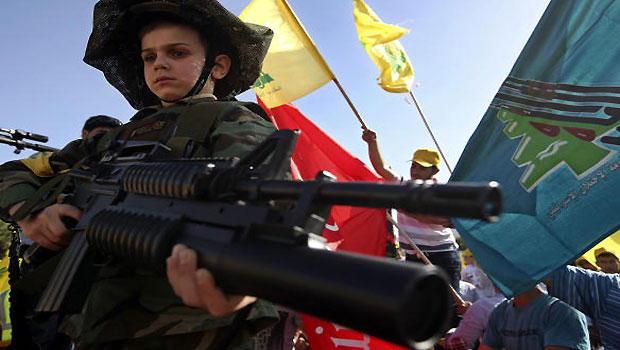If you think the title of this piece is ironic, you are mistaken. Following a speech by the leader of Hezbollah on Saturday evening, Hassan Nasrallah is now protecting Bashar Al-Assad—not the other way around. Nasrallah’s speech was a complete coup against the Lebanese state and the political balance in the region that has been in place since the founding of Hezbollah.
Nasrallah proclaimed in his latest speech, which was addressed to all the Lebanese, that he “is” Lebanon. He also announced that Lebanon is a Shi’ite protectorate, and divided the region into two camps in precisely the same manner that Bin Laden did. Nasrallah considered himself to be leader of a velayat-e faqih (Guardianship of the Jurist) axis, confronting a takfirist axis allied to the US and Israel—meaning the Sunnis in Syria and Lebanon and regional Sunni states, particularly Saudi Arabia.
Interestingly, in an attempt to distance himself and his party from suspicions of sectarianism, Nasrallah noted that Hezbollah had acted in defense of the Sunnis by participating in “jihad” in Bosnia. He seems to be forgetting that those he now describes as “takfirists,” “grave-robbers” and “heart-stabbers” also took part in the Bosnia jihad.
Nasrallah has divided the Middle East into two axes; he has announced that the toppling of the Assad regime would be to stab the “resistance” in the back. In doing so, he has nullified the historic political balance in Hezbollah’s relationship with Syria.
In the days of Hafez Al-Assad, Nasrallah would be invited to Damascus—even disciplined, if necessary, as if he were any other politician. Today, the situation is different. Hezbollah—not Iran—is now the official protector of Assad and it is publicly promoting itself as such.
According to Nasrallah’s speech, Assad is under his protection. He lauded this position, claiming that he is able, with just two words, to mobilize a larger number of Hezbollah fighters without needing to call for jihad in Syria. All this, of course, could ignite a sectarian war throughout the region, whether Assad stays or goes.
Nasrallah’s speech was a suicidal one. He has lost his popularity among those who were deluded by him, and the party has now become shrouded in sectarianism and is completely without legitimacy. Therefore, the part of the speech directed at his followers was emotional and laced with a tone of supplication, unlike the condescending tone he used when talking about Lebanon and Syria, and even Assad. This could be seen when Nasrallah said that “the man is offering you reforms”: he did not say “president,” but rather “the man.”
As such, it is not surprising that Nasrallah may invite Assad to the southern suburbs of Beirut in order to tell him what actions must and must not be taken. This is similar to what Assad senior did with some Lebanese politicians, including Hassan Nasrallah himself. The Hezbollah leader has ignited a sectarian fire in the region that he will, by no means, survive.
